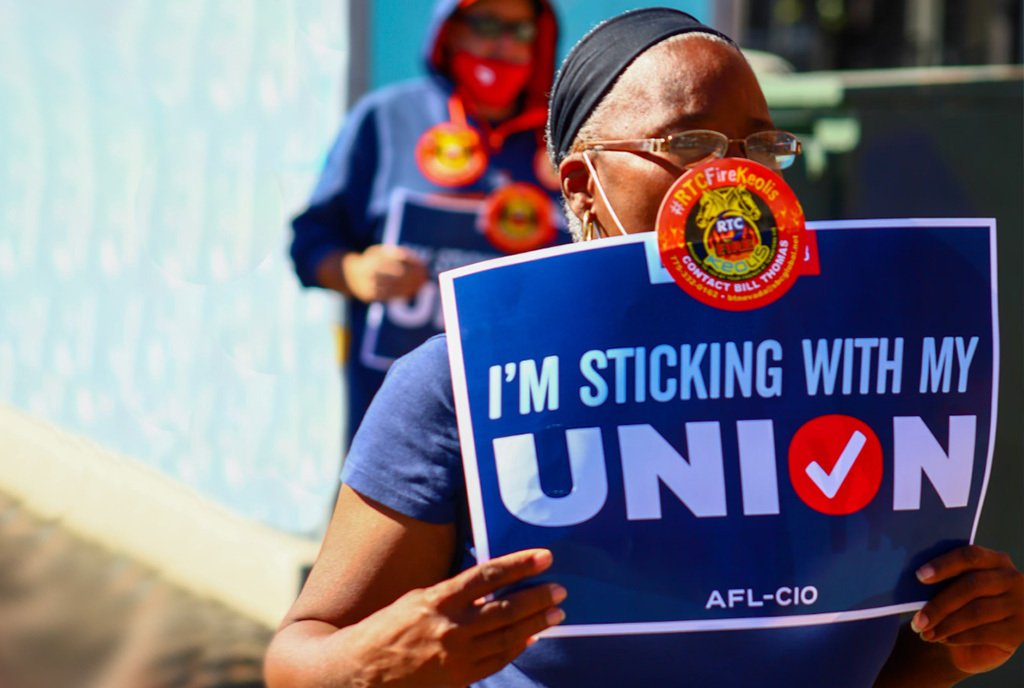
The past decade has marked a period of democratic decline at home and abroad. Global watchdogs are sounding the alarm about the rise of autocrats and the sobering increase of misinformation, partisan rancor, and even political violence in the United States.
The erosion of democratic institutions and undermining of democratic norms has alarmed funders across philanthropy in the United States, who understand that this instability threatens our longstanding investments in issues from civil rights to environmental justice and beyond. Many have mobilized to shore up the cracks in our democratic foundation by supporting civic education, nonprofit news sources, and initiatives that increase voter access and electoral transparency.
In other words, our democracy needs work—more specifically, democracy needs workers.
These efforts are immensely worthy but incomplete without focusing on another cornerstone of American democracy: labor. By funding worker institutions that improve wages and working conditions, strengthening collective power, and expanding models of democratic engagement, philanthropy can strengthen our country from the ground up.
In a nation where rising inequality has fractured Americans into factions, raising the stakes of partisan battles, organized labor has the power to address some of our most pressing and polarizing problems. Worker institutions model the power of democracy at every level and act as a powerful vehicle for mass civic engagement.
As the director of the Ford Foundation’s Future of Work(ers) program, I have seen firsthand how our work to strengthen democratic values and reduce economic inequality is deeply inextricable and mutually reinforcing. And I have witnessed the outsized impact this connection has on marginalized workers—particularly low-income workers, workers of color, LGBTQ+ workers, and workers with disabilities—as they advocate for themselves from the picket line to the polls.
In other words, our democracy needs work—more specifically, democracy needs workers. Investing in organized labor and supporting institutions like worker centers fundamentally improves democracy.
Fighting Inequality
We live in a time when fewer workers than ever belong to unions. In the late 1970s, the overall unionization rate in the United States was 25 percent of all workers compared to just over 10 percent today. This tracks with the rise in economic inequality over the last four decades when employers and policymakers increased political opposition to the laws and regulations protecting worker prosperity.
On a national scale, we know that union membership increases both wages and equality, nearly halving the racial wealth gap between Black and White families who belong to unions while raising female workers’ hourly wages by nearly 10 percent compared to non-unionized women. Strengthening organized labor and other workers’ institutions fortifies democracy by attacking the economic inequality that destabilizes it.
Worker institutions model the power of democracy at every level and act as a powerful vehicle for mass civic engagement.
Unions and other worker organizations are not only vehicles for economic justice. They are also models for civic engagement, with thousands of members coming together to fight for higher wages, better work protections, and other issues that affect their lives. Organized labor and other workers’ institutions play an essential role in empowering communities at risk of alienation by marginalized workers who lack individual bargaining power on better economic footing with a greater collective voice.
The promise of participatory government as a means of advancing a more free and equal society, full of greater opportunity, is a powerful ideal that drives American investment in democracy. When that promise goes unrealized, when rising inequality and lack of opportunities make Americans feel unheard and unheeded, they become alienated, losing faith in the power and value of their vote—and in the whole system.
However, when that promise is realized, the investment can shift in favor of the working class—and, at times, ripple across industries. Take the recent victory by the Writers Guild of America, which, after a 148-day strike, won protections against the use of artificial intelligence, a feat of regulation that even governments have found vexing. Or the collective bargaining efforts of UPS workers, whose part-time workers won $21 an hour minimum wage and whose full-time workers won $49 an hour wage. Their demands were backed by Hollywood writers and actors across picket lines and vice versa.
We saw this kind of support again when Jobs to Move America, a coalition of community, civil rights, labor, and faith groups, successfully brokered a Community Benefit Agreement (CBA) with leading electric bus maker New Flyer. The CBA, a mechanism for communities to negotiate directly with developers, guaranteed that 45 percent of new hires in an Alabama manufacturing plant would come from historically marginalized groups, including Black and Indigenous workers, women, and veterans. This is a landmark win for workers in the deep South—a region with some of the country’s lowest wages and unionization rates, particularly for workers of color.
Because strong unions improve life for all workers in low-wage work, worker institutions also address the economic insecurity at the heart of a strain of populism that all too often bleeds into nativism and discrimination. Throughout history and into today, an electorate that feels left behind by their government may be more likely to shift the blame to immigrants and other marginalized communities or slide towards autocracy when strong-man leaders make false promises of better days. A strong labor movement that unites workers behind a common cause defangs this instinct towards division, undercutting the appeal of movements that divide working-class people and turn them against one another.
Putting Democracy into Practice
When anti-democratic forces take power, they weaken the institutions that can push back. Look no further than attacks on worker organizations, which undermine their advocacy and result in stagnant wages, benefits, and working conditions. In a vicious cycle, weakened worker organizations then struggle to advocate for their members, including those from marginalized communities, when those in power pass discriminatory, anti-democratic policies.
It’s not hard to understand that when people see the system isn’t working for them, they no longer see the value of voting and become disengaged from other kinds of democratic participation. The National Bureau of Economic Research found that voter turnout for presidential elections averaged 2 to 3 percent lower in counties with union-busting right-to-work laws compared to bordering counties without such restrictions.
Sign up for our free newsletters
Subscribe to NPQ's newsletters to have our top stories delivered directly to your inbox.
By signing up, you agree to our privacy policy and terms of use, and to receive messages from NPQ and our partners.
Conversely, exercising democratic muscles in a union setting prepares voters to flex their power beyond it. Worker organizations depend on workers to vote, elect leadership, participate in collaborative processes, and engage in organizational decision-making. This cultivates democratic participation and fosters the expectation that democracy can work, turning previously lower-engagement voters into activists and organizers who advocate for their rights in their workplace and the broader world.
That’s the animating principle behind the Southern Workers Opportunity Fund, created by Labor Innovations for the 21st Century (LIFT). LIFT works across southern states to encourage civic engagement amongst workers and encourage them to advocate for changes at the city, county, and state levels that will better support them as workers.
There is also significant overlap between policies supportive of worker organizing and policies that support democracy as a whole. The Economic Policy Institute found that significantly fewer restrictive voting laws have been passed in the 17 highest-union-density states than in the rest of the country. (Consider that 70 percent of low-union-density states passed at least one voter suppression law between 2011 and 2019.)
The Fund and other organizations like it understand that as workers across the country participate in government at every level, their involvement will enhance the way they value and understand democracy and its complexities on a national scale.
Building Community
A thriving democracy depends on voters who are educated and engaged. But today, misinformation, disinformation, and a general disconnect drive voter disengagement. Funding worker organizing is a force multiplier for democratic engagement across various labor-adjacent issues.
Strong unions and other workers’ institutions serve as trusted vectors for information that impacts their members, underscoring the connections between labor and other related issues, from manufacturing and transportation policy to environmental justice.
During the heart of the pandemic, Bargaining for the Common Good united 59 labor, community, and religious organizations, calling for a state budget that prioritized workers and mitigated racial, economic, and gender disparities for working communities across Connecticut. Central to these calls for better wages and improved working conditions were the nursing home workers who labored under acute staffing shortfalls and wholly inadequate protections, including being forced to wear trash bags during shifts because of the lack of personal protective equipment. The result of this cross-movement, cross-issue mobilizing was a budget that increased funding for mental health services, including $5 million in resources for mobile crisis units and a $5 per hour wage increase for nursing home workers.
Confronting polarization and voter disengagement are critical to addressing democratic dysfunction.
Voters who might not turn out for an infrastructure bond measure may be mobilized by the knowledge that the funding translates to good union jobs. Workers who may not consider themselves environmentalists could be galvanized by the understanding that green manufacturing will open up new professional possibilities. This broader engagement across interconnected issue areas both drives informed working voters to the polls and adds up to a more just and sustainable economy—another essential building block of a stable democracy.
Labor organizations, in turn, are embracing a holistic view of the issues that impact their members. Restaurant Opportunities Centers United, an organization dedicated to improving restaurant workers’ lives, has thrown its weight behind campaigns to raise the minimum wage for tipped workers—and also championed greater access to childcare and reforms to sexual harassment policy. This expansive approach acknowledges how workers’ rights intersect with racial and gender equity, immigration, public health, and other issues where democratic engagement is essential to progress.
The benefits of organized labor are overwhelming, and when we undercount its value in our funding, we hurt our own strategic philanthropy. Philanthropy has innovated to build both the reach and depth of worker movements.
Take, for instance, the Advancing Black Strategists Initiative, which supports Black worker-leaders in accessing direct experience and developing and implementing strategies to expand organizing and collective bargaining power with Black-led campaigns in the South. This effort addresses the need for representative leadership in the future of labor movements by offering emerging leaders the opportunity to join a fellowship to examine the effects of race, class, gender, and power on workers across the South and inform national discourse on how to expand organizing and collective bargaining power for everyone based on these experiences.
Confronting polarization and voter disengagement are critical to addressing democratic dysfunction. Those efforts will be incomplete, however, without fortifying worker power. In the face of democratic contests this year and in the long term, philanthropy has an opportunity to bolster one of the most important drivers of political and economic enfranchisement.
Supporting workers by funding the institutions that improve wages and working conditions, build collective power, and expand models of democratic engagement improves democracy fundamentally as a practice—and philanthropy has an opportunity to strengthen our country from the ground up.
It’s time for us all to invest in the workers who make our democracy work.








